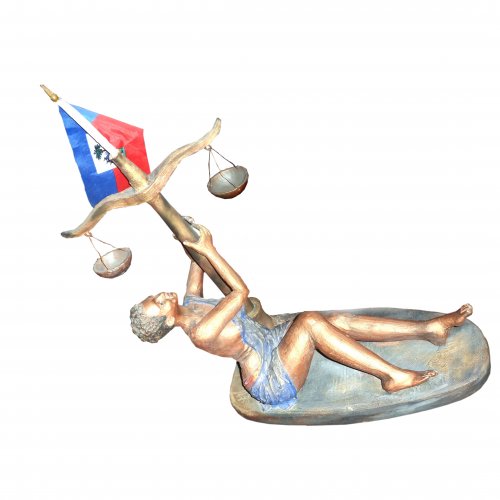Best Natural Resources Lawyers in Haiti
Share your needs with us, get contacted by law firms.
Free. Takes 2 min.
Or refine your search by selecting a city:
List of the best lawyers in Haiti
About Natural Resources Law in Haiti
Natural resources law in Haiti involves the regulations and policies governing the extraction, use, and conservation of Haiti's natural resources. The country is endowed with a variety of natural resources, including minerals, arable land, and coastal and marine resources. However, unsustainable exploitation and environmental challenges necessitate legal frameworks to protect these assets. This field of law deals with issues such as land use, environmental protection, mining rights, and the sustainable management of resources.
Why You May Need a Lawyer
Legal assistance in natural resources is essential for various reasons. Common situations where you may need a lawyer include negotiating and drafting contracts for resource extraction, navigating the regulatory and compliance landscape, resolving land disputes, ensuring adherence to environmental laws, and securing permits and licenses for resource utilization. Additionally, individuals and businesses may require legal guidance in dealing with government entities and understanding the implications of international agreements affecting local resources.
Local Laws Overview
In Haiti, natural resources are governed by a combination of constitutional provisions, local statutes, and international agreements. Key aspects include the Mining Code, which outlines the rules for mineral extraction, and environmental regulations that mandate the conservation of biodiversity and sustainable management of resources. Land ownership laws are also crucial, given the importance of ensuring rights are respected and disputes are resolved fairly. Haiti's legal system also emphasizes community involvement and public participation in decisions impacting natural resources.
Frequently Asked Questions
What are the main natural resources in Haiti?
Haiti's primary natural resources include minerals such as gold and copper, fertile land for agriculture, and marine resources along its extensive coastline.
How are land rights determined in Haiti?
Land rights in Haiti are complex and can be based on formal title deeds, customary tenure, or communal ownership, often requiring legal assistance for clarity.
What environmental protections are in place?
Haiti has laws that aim to protect biodiversity, control pollution, and promote sustainable land management, often enforced through local environmental agencies.
How can I obtain a mining license in Haiti?
To obtain a mining license, you must apply through the appropriate governmental bodies, providing technical and environmental impact assessments as required by law.
What role do local communities play in resource management?
Local communities are encouraged to participate in decision-making processes concerning resource management, ensuring that their interests and traditional knowledge are considered.
Are there restrictions on foreign entities exploiting resources?
Yes, there are specific legal provisions regulating foreign involvement in resource extraction, often requiring partnerships with local entities and adherence to stricter environmental standards.
Can individuals engage in artisanal mining?
Artisanal mining is permitted under certain conditions, typically requiring less stringent licensing but still subject to environmental and safety regulations.
What happens if there is a dispute over resource use?
Disputes can be resolved through mediation, arbitration, or litigation in local courts, often necessitating legal representation to navigate the process effectively.
Are there special regulations for coastal resources?
Coastal resources are protected by specific regulations focusing on marine conservation, sustainable fishing practices, and protection of coastal ecosystems.
How does international law impact Haiti's natural resources?
Haiti is a signatory to various international agreements that influence its resource management, including conventions on biodiversity, climate change, and environmental protection.
Additional Resources
For more information or assistance, consider reaching out to the following resources: - The Ministry of the Environment - Bureau of Mines and Energy - Local environmental non-governmental organizations (NGOs) - Legal aid clinics specializing in natural resource law - International agencies working in sustainable development and environmental conservation in Haiti
Next Steps
If you require legal assistance in matters related to natural resources in Haiti, consider contacting a lawyer specializing in environmental or natural resource law. Start by gathering all relevant documents and information about your situation, then reach out to local legal associations or bar associations to find qualified attorneys. Setting up an initial consultation can help clarify your needs and the potential legal pathways available to you.
Lawzana helps you find the best lawyers and law firms in Haiti through a curated and pre-screened list of qualified legal professionals. Our platform offers rankings and detailed profiles of attorneys and law firms, allowing you to compare based on practice areas, including Natural Resources, experience, and client feedback.
Each profile includes a description of the firm's areas of practice, client reviews, team members and partners, year of establishment, spoken languages, office locations, contact information, social media presence, and any published articles or resources. Most firms on our platform speak English and are experienced in both local and international legal matters.
Get a quote from top-rated law firms in Haiti — quickly, securely, and without unnecessary hassle.
Disclaimer:
The information provided on this page is for general informational purposes only and does not constitute legal advice. While we strive to ensure the accuracy and relevance of the content, legal information may change over time, and interpretations of the law can vary. You should always consult with a qualified legal professional for advice specific to your situation.
We disclaim all liability for actions taken or not taken based on the content of this page. If you believe any information is incorrect or outdated, please contact us, and we will review and update it where appropriate.
Browse natural resources law firms by city in Haiti
Refine your search by selecting a city.








